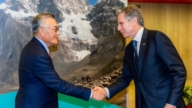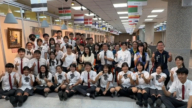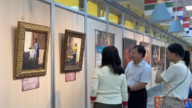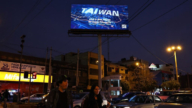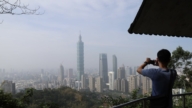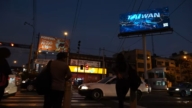【新唐人2011年5月6日訊】《新唐人亞太臺》與台灣「中華電信」公司的衛星租約,遭到「中華電信」片面終止續約,事件引發美國國會資深眾議員戴納.羅拉巴克(Dana Rohrabacher)的高度關切。與此同時,《新唐人亞太臺》也向台灣的主管機關NCC陳情,希望台灣政府維護中華民國憲法所保障的「言論及新聞自由」。
戴納.羅拉巴克議員在5月3號「世界媒體自由日」當天,發出一封給中華民國馬英九總統的信函,他措辭強硬質問馬英九總統這個決定的「背後動機」,他還說出重話,表示,如果台灣不支持或聲援中國境內對思想自由的奮戰,他認為,美國沒有必要支持台灣。
台灣電信業的龍頭「中華電信」,旗下的「國際電信分公司」在四月中對《新唐人亞太電視臺》表示,今年八月衛星服務合約到期後不再續約,理由是新的衛星「中新二號」頻寬不足。
而《新唐人亞太臺》發言人朱婉琪律師表示,《新唐人亞太臺》租用「中華電信」「中新一號」衛星至今四年多,台灣約有三分之一的有線電視收視戶可以收看到《新唐人》節目,因此被中共視為眼中釘。
她質疑,「中華電信」在公開資料上介紹說:「中新二號」衛星比「中新一號」衛星性能優越、涵蓋範圍更廣、發射功率更高,承載的轉頻器數量及頻寬更多。與《新唐人》不再續約的理由明顯不符。
台灣訊息流通事業最高主管機構NCC(國家通訊傳播委員會),5月3號早上收到《新唐人》的申訴書。NCC營運管理處官員表示,依據電信法相關規定,「中華電信」為市場主導業者,針對客戶不得為「差別服務」,也就是不能無故任意挑選客人。
吳政翰 (中華民國「自由通訊傳播協會」秘書長):「中華電信對於新唐人可能發生的差別待遇,我們是希望政府也能出面介入,希望中華電信秉持公正客觀的態度,對新唐人的續約予以合理的評斷」
2008年6月,《新唐人》紐約總臺租用的歐洲「歐衛公司」衛星轉發器,遭到關閉﹔2009年十一前後,《新唐人亞太臺》遭長時間蓋臺斷訊,當時,事件都曾引起許多國際組織的關注。
新唐人亞太電視臺 發言人 朱婉琪:「台灣政府,應該要強烈去要求,它所實質控制的中華電信,要符合台灣的民主法治的標準,來對待台灣敢於維護新聞自由、不跟商業利益妥協的新唐人亞太臺」
上個月29號,台灣的中華民國總統馬英九,接受德國《明鏡》週刊訪問時,特別說明瞭為甚麼要與中共持續發展關係。他說,就是要用台灣的自由、民主、人權和法治來影響中共。
台灣「自由通訊傳播協會」理事長吳惠林,也在媒體發表評論文章,他表示,政府保障獨立媒體的發聲,就是在維護民主社會中憲法所保障的「言論及新聞自由」核心價值。有鑒於此,對於任何企業或個人,以任何方式犧牲或損害獨立媒體發聲,做出有悖普世價值、民主潮流的作為,政府從憲法保障的角度應該介入,讓報導兩岸三地真相的媒體繼續在民主台灣發聲。
新唐人記者李庭、薛莉綜合報導。
Blockage of Taiwan’s NTDTV Broadcasts
New Tang Dynasty Asia Pacific Television (NTD AP)
leases a satellite from Taiwan’s Chunghwa Telecom.
Chunghwa’s refusal to renew the contract concerns
senior U.S. Congressman Dana Rohrabacher.
NTD AP has also filed an appeal with Taiwan’s NCC
(National Communications Commission), hoping that
the Taiwanese government will help safeguard citizens’
constitutional rights of speech and press freedom.
On May 3, World Press Freedom Day,
Rohrabacher wrote to Taiwan’s President Ma Ying-jeou,
questioning him about the incident’s “underlying motives."
Rohrabacher warned Ma, saying that if Taiwan doesn’t
support China’s fight for freedom of thought, he believed
that U.S. support for Taiwan will become unnecessary.
Taiwan’s leading telecom company, Chunghwa’s
subsidiary, CHT-International, told NTD AP in mid-April,
that after the satellite contract expired in Aug 2011, it
would not be renewed, due to the “insufficient
capabilities” of the new ST-2 satellite.
NTD AP spokeswoman Attorney Theresa Chu said,
NTD AP has been leasing the ST-1 satellite for over
4 yrs, broadcasting to 1/3 of Taiwan’s cable TV viewers.
As a result, the Chinese authorities (CCP) see
NTD AP as a thorn in their side.
Chu questioned Chunghwa’s claim that its ST-2
satellite is more capable than its predecessor, the ST-1,
having a wider coverage area and more powerful
transmission power. This claim contradicts Chunghwa’s
reasons to refuse to renew its contract with NTD AP.
Taiwan’ National Communications Commission (NCC)
received NTD AP’s appeal on May 3.
NCC Operations officials said that as per the Telecom
Act, Chunghwa, as a leading firm in the telecom industry,
cannot give “preferential treatment" to its clients, meaning,
it cannot arbitrarily select its customers.
Wu Cheng-Han, Secretary-General of Taiwan’s
Free Communication Association:
Satellite services are very important for a TV station.
Without it, audiences would be significantly affected.
I hope Chunghwa will adopt a fair, reasonable, and
objective attitude towards renewing NTD’s contract.
In June 2008, European telecom company Eutelsat,
stopped renting a satellite transponder to NTD.
Shortly before the CCP’s state celebration in Oct 2009,
NTD AP was being blocked for long periods of time.
This attracted the attention of many international orgs.
NTD AP spokeswoman Theresa Chu: We believe that
the Taiwanese government should strongly request
that Chunghwa—which it controls—respect and value
Taiwan’s democracy and rule of law, and make the
right decision to renew the contract.
On April 29, Taiwanese President Ma Ying-jeou,
told German Der Spiegel magazine the reason Taiwan
needs to develop good relations with the CCP. Ma said
he would use Taiwan’s freedom, democracy, human
rights, and the rule of law to influence the CCP.
Free Communication Association’s chair, Wu Huilin,
commented that the Taiwan government’s protection
of the voice of independent media is the protection of
the constitutional values of speech and freedom of press.
If any business/individual prevents independent media
from having a voice, contrary to universal values, the
government should intervene from the perspective
of guarantying constitutional rights, and ensuring that
the media continues to report the truth.
NTD reporters Li Ting and Xue Li




